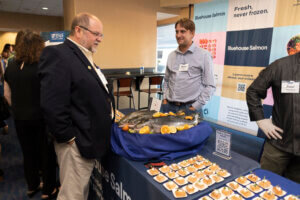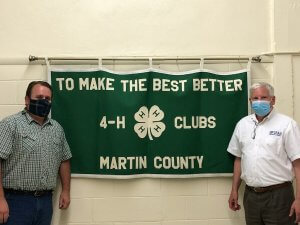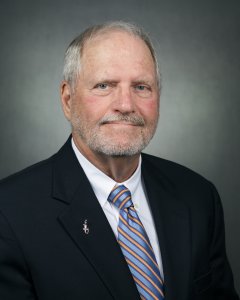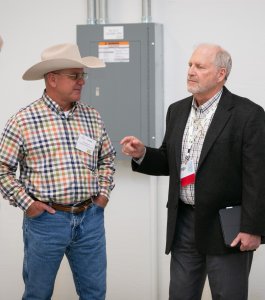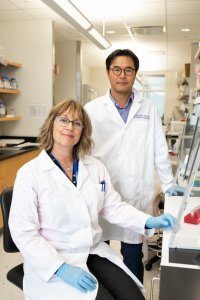February 2025 FloridAgriculture eNewsletter
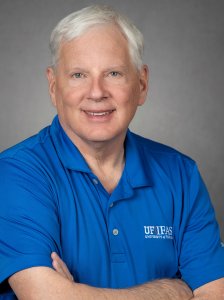 By J. Scott Angle
By J. Scott Angle
[email protected]
@IFAS_VP
At UF/IFAS we’re making another investment in artificial intelligence (AI) to support Florida farmers. It’s not a machine. It’s a dean.
I can’t think of anyone who has devoted more time and thought to preparing the future workforce for an AI-driven world than Kati Migliaccio. That’s a big part of why I chose her to be the first new dean of the UF/IFAS College of Agricultural and Life Sciences (CALS) in a decade.
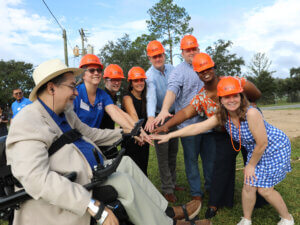
As AI in Florida agriculture evolves, Migliaccio will reshape the education of the people who will work in it, some of them in jobs that don’t even exist yet.
In fact, she’s been doing it for years already. She led the group that developed a university-wide plan to ensure all students have access to opportunities to acquire AI knowledge and skills.
Migliaccio is an engineer and brings that problem-solving mindset to complex challenges. During her six years as chair of the UF/IFAS Department of Agricultural and Biological Engineering (ABE) she championed a holistic approach to innovation, encouraging teams to consider how individual problems and solutions interact and contribute to the bigger picture, rather than addressing each issue in isolation.
She has also marshalled the expertise of other UF colleges, especially the Herbert Wertheim College of Engineering, to seek solutions to agricultural challenges.
As dean, her focus on AI-related instruction will also now benefit students in departments such as Family, Youth and Community Sciences or Food Science and Human Nutrition.
Her engineer’s focus on practical solutions to real-world problems has helped drive a campaign to build a new workshop for ABE. We held a groundbreaking in the fall to kick off construction of the facility. When it’s done, it will be a hub for hands-on learning, where students can learn to use tools and develop technological prototypes you’ll be using as the AI-literate corps of graduates begin working for and with you.
She has also emerged as a leader in standing up agricultural technology workforce development programs statewide through our state college partners.
Engineers like Migliaccio also share an ethic of striving for continuous improvement and experimentation. That’s what has kept her department near the top for so long. At a university with lots of engineering departments, ABE ranks by far the highest, perennially in the top 10 nationally.
Migliaccio brings this ethic to her new job. CALS is already one of the top schools in the nation. To become the best, we need someone who never stops trying to improve things.
Migliaccio demonstrates and fosters the culture of excellence I seek across all UF/IFAS. With few peers matching our level of distinction nationally, a culture of excellence will help us compete with ourselves—striving to be better this year than last. To do more for our farmers and ranchers and foresters and fishers, as well as those who manage our natural resources.
A culture of excellence supports students with a world-class education, combining great instruction with practical experiences like internships. CALS will continue to produce graduates ready for work, advanced studies or service.
Those graduates will be ready to help you help Florida feed the world.
J. Scott Angle is the University of Florida’s Senior Vice President for Agriculture and Natural Resources and leader of the UF Institute of Food and Agricultural Sciences (UF/IFAS).

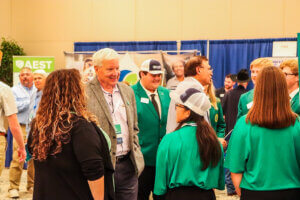 To Michael Dooner, agriculture is a way to protect the earth. As a forestry leader, your immediate past treasurer champions the benefits of agriculture to filter and produce abundant clean water and air, sequester carbon, and harbor wildlife. He wants to see producers recognized and compensated for what they contribute to society, not just what they produce.
To Michael Dooner, agriculture is a way to protect the earth. As a forestry leader, your immediate past treasurer champions the benefits of agriculture to filter and produce abundant clean water and air, sequester carbon, and harbor wildlife. He wants to see producers recognized and compensated for what they contribute to society, not just what they produce.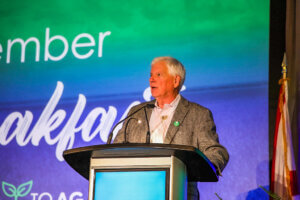 Together these conversations reminded me of what a jewel agriculture is. Each conversation was like turning that jewel ever so slightly and appreciating the glint of each facet.
Together these conversations reminded me of what a jewel agriculture is. Each conversation was like turning that jewel ever so slightly and appreciating the glint of each facet.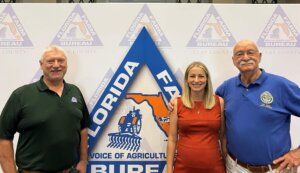
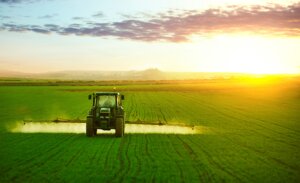 The U.S. Food and Drug Administration (FDA) has published a final rule that revises pre-harvest agricultural water provisions in the FSMA Produce Safety Rule. The rule replaces the previous microbial quality criteria and testing requirements with systems-based, pre-harvest agricultural water assessments.
The U.S. Food and Drug Administration (FDA) has published a final rule that revises pre-harvest agricultural water provisions in the FSMA Produce Safety Rule. The rule replaces the previous microbial quality criteria and testing requirements with systems-based, pre-harvest agricultural water assessments.